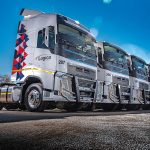Freeway: keeping the wheels turning
Freeway: keeping the wheels turning
Freeway Fleet Systems’ customers supply critical goods and services internationally. We caught up with MD Patrick Tandy at the company’s Johannesburg office to talk about the experiences of Freeway’s customers during the lockdown – here and overseas – as well as his view on what will change thanks to Covid-19
How have transport services managed through lockdown?
Our customers have worked incredibly hard to keep vehicles on the road to supply essential goods, while local authorities and utilities have maintained critical services. Vehicles don’t run themselves – it’s the drivers, engineers and managers that have kept the wheels turning; there is dedication in workshops and stores nationwide, often with fewer staff and extra workloads.
Do passenger transport operators also use Freeway?
Despite fewer passengers, because of distancing, operators have had to increase the frequency of services. They face intense engineering, operational and financial pressures. We have been working with operators globally on efficiency improvement and cost-reduction.
You supply internationally. Have you found differences between nations?
In Singapore, Harare and London we are facing exactly the same issues and challenges that we are facing in Johannesburg.
Have you changed the way you deliver your services?
Pre-Covid-19, there was already a move towards “cloud” solutions, as this allows operators to focus on their core business. The last few months have intensified the switch as a cloud solution also makes working at home easy.
How are you providing training and support?
We’ve enhanced our online information portal and refreshed video training materials. This is proving essential for our users who are often performing multiple roles with the need for additional support.
Do you think the changes will last?
I have no doubt that we will all manage our lives and businesses differently after the lockdown. Physically visiting workshops and stores and meeting in person will always be important to us, but our new digital training delivery will permanently reduce the cost of implementation.
How can a system help safe working?
Freeway simply replaces unsafe paper with a smartphone, which eliminates the handling of documents. In recent months the switch to digital has accelerated, but it is as much about efficiency as safety, as there are fewer people and they are having to take on more work.
What about driver inspections?
Driver cards need to be handled. We recommend the use of smartphone or an optical character-recognition
(OCR) solution that reads from the cards to eliminate keying in.
What approach do you recommend in the workshop?
Provide fitters with a simple digital in-box list to replace the old-style job cards and time sheets. And use the same smartphone to record breaks, access history, issue parts and sign-on-glass that the work has been done.
Is procurement also digital?
Every step of the process is digital – from issue of parts on the workshop floor, to processing of supplier invoices. Fitters can check for parts availability on their devices and can request the parts from stores. The stores also can be set to auto-replenish and part orders can be generated, authorised and received on phones. We’ve even eliminated the manual matching of invoices using an automated OCR process.
Before Covid-19 we were already seeing a move away from paper. Now we are seeing a renewed urgency, as paper is inefficient and can spread infection.
Published by
Focus on Transport
focusmagsa




